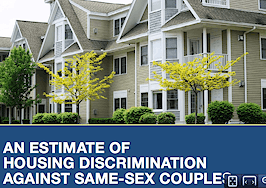As you doubtless know if you’ve paid any attention to the news, the United States Supreme Court’s decision in United States v. Windsor struck down the portion of the Defense of Marriage Act (DOMA) that required that same-sex spouses be treated as unmarried for purposes of federal law.
The court held that not recognizing same-sex marriages was an unconstitutional deprivation of equal protection.
The Windsor decision has many significant tax consequences for same-sex spouses. Right now, these appear to be limited to same-sex spouses who were married and live in a state that recognizes same-sex marriages. This is because the IRS uses the taxpayer’s state of residence to determine whether he or she is married for tax purposes.
Currently, nine states and Washington, D.C., recognize same-sex marriage. These states include: Connecticut, Iowa, Massachusetts, Maine, Maryland, New Hampshire, New York, Vermont and Washington.
Three more states will soon recognize such marriages: Delaware beginning July 1, 2013, and Minnesota and Rhode Island, effective Aug. 1, 2013.
It appears that same-sex marriages will also soon be recognized in California, pending the lifting of a stay on the District Court ruling overturning Proposition 8.
Same-sex spouses who live in these states are now able to file joint federal income tax returns as married couples.
It appears that same-sex spouses who live in a state that does not recognize same-sex marriage will continue to be treated as unmarried by the IRS. For example, a same-sex couple who were married in Massachusetts but later moved to Florida would be treated as unmarried. However, this needs more clarification and could change.
For same-sex spouses living in a state that recognizes their marriage, filing jointly will reduce income taxes for some, but increase them for others.
Windsor also has important ramifications for such same-sex spouses who own, or plan to own, real estate. They will now be able to take full advantage of some of the most important tax breaks for homeowners.
Home mortgage deduction
Subject to certain limits, the interest on a home mortgage is deductible. This is one of the greatest tax benefits of homeownership.
Pre-Windsor: All same-sex spouses had to file separate returns, because their marriage wasn’t recognized by the IRS. As a result, same-sex spouses who co-owned a home and had a mortgage together had to split the home mortgage deduction between them.
Such a split had to be based on the percentage of the mortgage interest payments each spouse paid. For example, if one spouse paid 60 percent, and the other 40 percent, they could each deduct that amount on their separate returns.
However, the home mortgage interest deduction is an itemized personal deduction that should only be taken if a taxpayer’s total itemized deductions exceed the standard deduction. Splitting the mortgage deduction in two could result in either or both spouse’s itemized deductions being lower than the standard deduction and make it impossible for them to deduct any mortgage interest.
Post-Windsor: Same-sex spouses living in a state recognizing same-sex marriage who own a home and have a mortgage together will be able to claim the home mortgage interest deduction jointly on their joint tax return, like any other married couple. There is no need to split the deduction.
$250,000/$500,000 home sale exclusion
The tax law provides homeowners with a very generous tax exclusion when the sell their principal residence. Up to $250,000 of the gain from such a sale received by a single homeowner is tax-free. For married homeowners filing jointly, up to $500,000 of gain is tax-free. To qualify for the exclusion, the home must have been used as a main home for two years out of the prior five before the sale. Moreover, a surviving spouse may claim a $500,000 exemption if the home is sold within two years of the death of his or her spouse.
Pre-Windsor: Because same-sex spouses could not file jointly, they were each limited to a the $250,000 exemption for single taxpayers. They could not claim a combined $500,000 exemption. Each spouse had have to qualify separately for their $250,000 deduction. Thus, for example, each spouse had to separately satisfy the two-year use requirement. In contrast, for married couples filing jointly only one spouse must satisfy this requirement. In addition, if one spouse died, the other could not claim the $500,000 exemption for surviving spouses.
Post-Windsor: Because they may file jointly as married, same-sex spouses living in a state recognizing same-sex marriage now qualify for the $500,000 exclusion. If one spouse dies, the surviving spouse qualifies for the $500,000 exemption if the home is sold within two years.
Gifting or leaving real estate and other property to spouse
The tax law treats married couples very well when it comes to estate taxes. A spouse may leave his or her entire estate to their surviving spouse tax free, regardless of its value. Spouses may also gift any amount of property to each other tax-free while they are alive.
Pre-Windsor: Because they were not recognized as married by the IRS, same-sex spouses did not qualify for these spousal exemptions to the estate taxes. This is what caused Edith Windsor to challenge the IRS. When her spouse died she inherited a $4 million estate, including a co-op in Greenwich Village. However, the IRS would not permit her to take advantage of the unlimited spousal exemption because of DOMA. As a result, she had to pay $363,053 in estate taxes.
Post-Windsor: Same-sex spouses living in a state recognizing same-sex marriage can now use the same spousal exemptions as heterosexual couples. As a result, Edith Windsor will be entitled to a $363,053 tax refund (plus interest).
This consequence of Windsor will benefit only very wealthy same-sex spouses. The estate and gift tax exemption is currently $5.25 million per individual, so very few same-sex or heterosexual spouses need worry about estate taxes. However, as a result of Windsor, same-sex spouses living in a state recognizing their union now qualify for a $10.5 million estate tax exemption.
Stephen Fishman is a tax expert, attorney and author who has published 18 books, including “Working for Yourself: Law & Taxes for Contractors, Freelancers and Consultants,” “Deduct It,” “Working as an Independent Contractor,” and “Working with Independent Contractors.




